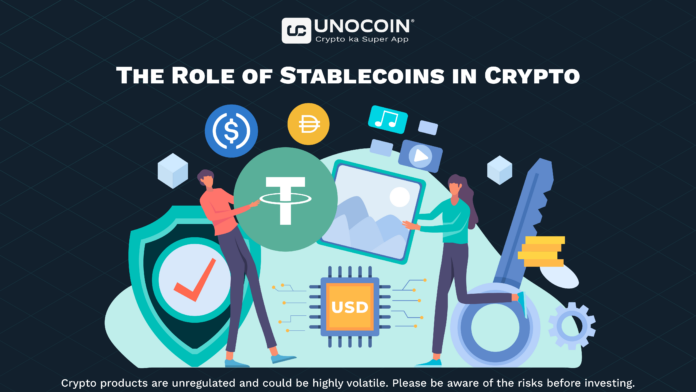Stablecoins are a type of cryptocurrency designed to maintain price stability by tying their value to a stable asset such as fiat currency (e.g. USD, EUR) or commodity (e.g. gold). Unlike traditional cryptocurrencies such as Bitcoin or Ethereum, which are known for their price volatility, stablecoins provide a reliable medium of exchange and store of value, making them suitable for a variety of use cases within the crypto ecosystem. Here’s a closer look at the role of stablecoins:
Price stability: The primary role of stablecoins is to maintain a stable value relative to a chosen peg. This stability makes stablecoins suitable for everyday transactions, money transfers and as a hedge against cryptocurrency volatility. Users can hold and trade stablecoins without having to worry about significant fluctuations in their value.
Ease of Trading and Liquidity: Stablecoins serve as the underlying trading pairs on cryptocurrency exchanges, allowing users to easily convert between volatile cryptocurrencies and fixed assets. By providing liquidity and price stability, stablecoins facilitate trading, arbitrage, and market-making activities, contributing to the efficiency and liquidity of cryptocurrency markets.
Cross-border payments and transfers: Stablecoins enable fast, cheap and borderless transactions, making them ideal for cross-border payments and transfers. Users can transfer stablecoins internationally without the delays, fees and currency conversion costs associated with traditional banking systems. This facilitates financial inclusion and access to global markets for individuals and businesses around the world.
Decentralized Finance (DeFi) Ecosystem: Stablecoins play a central role in the rapidly growing decentralized finance (DeFi) ecosystem. They serve as the primary means of exchange, collateral, and liquidity within DeFi protocols, facilitating lending, borrowing, revenue management, decentralized exchanges (DEX), and other financial services. Stablecoins allow users to access decentralized financial products and services without exposure to cryptocurrency volatility.
Remittances and Financial Inclusion: Stablecoins have the potential to improve financial inclusion by providing access to digital payments and banking services for underserved populations worldwide. With stablecoins, individuals in regions with limited access to traditional banking infrastructure can participate in the global economy, receive remittances and access basic financial services with just a smartphone and internet connection.
Transparency and Auditing: Many stablecoins operate on blockchain networks, allowing for transparency, auditability and real-time tracking of transactions. Users can verify the integrity of stablecoin issuers, ensure proper collateral, and track the supply and circulation of stablecoins on-chain. This transparency increases trust and confidence in stablecoin ecosystems.
Regulatory Compliance: Stablecoins pegged to fiat currencies often require compliance with regulatory frameworks that govern traditional financial instruments, such as anti-money laundering (AML) and know-your-customer (KYC) regulations. Unbacked stablecoin issuers typically maintain fiat currency reserves at regulated financial institutions to ensure full support and compliance with regulatory requirements.
Overall, stablecoins play a vital role in bridging the gap between traditional finance and the cryptocurrency ecosystem, offering stability, liquidity and interoperability for users, businesses and developers. As adoption continues to grow, stablecoins are poised to become an integral part of the global financial infrastructure, opening up new opportunities for innovation, efficiency and financial inclusion.
Please find the list of authentic Unocoin accounts for all your queries below:
- Twitter: https://twitter.com/Unocoin
- Instagram: https://www.instagram.com/unocoin/
- Facebook: https://www.facebook.com/unocoin/
- LinkedIn: https://in.linkedin.com/company/unocoin
- YouTube Channel: https://www.youtube.com/c/Unocoin/videos
- Newsletter: https://medium.com/subscribe/@Unocoin_growth
- Blogs: https://blog.unocoin.com
- Telegram Group: https://t.me/Unocoin_Group
- Telegram Channel: https://t.me/+fasQhTKBsfA5N2Zl
- Telegram: https://t.me/UnocoinSupport_Bot
- E-mail id: [email protected]
- Contact details: 7788978910 (09:30 AM IST – 06:30 PM, Mon-Sat)
- App store link: https://apps.apple.com/us/app/unocoin/id1030422972?ls=1
- Playstore link: https://play.google.com/store/apps/details?id=com.unocoin.unocoinwallet
Disclaimer: Crypto products are unregulated as of this date in India. They could be highly volatile. At Unocoin, we understand that there is a need to protect consumer interests as this form of trading and investment has risks that consumers may not be aware of. To ensure that consumers who deal in crypto products are not misled, they are advised to DYOR (Do Your Own Research).




